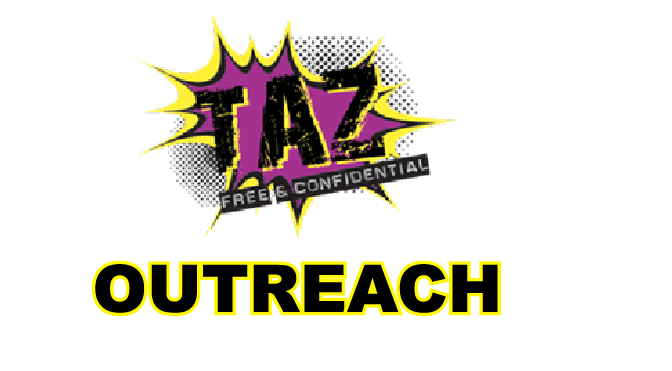TAZ Outreach Team

Tom, Hannah and Cathryn.
We're the people you might have seen in your school doing sex and relationships workshops, popping up in an assembly, or in a TAZ drop-in.
We work in the TAZ Clinic.
One of us will be at the TAZ clinic every weekday and if you go to TAZ you’ll be seen by one of us.
We work in High Schools.
You might have seen one of us teaching in your Sex Ed lessons, or maybe been part of a longer course that we do with smaller groups.
In some High Schools we also have a TAZ drop-in that you can go to for information, advice, condoms and other things (it depends what your school will allow!)
The drop-ins are confidential and everything we provide is free.
See below for more info about what confidentiality means.
If you want to ask a question about relationships or sexual health,
you can also email us at taz@sthk.nhs.uk
Sometimes young people work with us on their own, for lots of different reasons.
Often it’s because they need a bit of extra support with something that’s happening in their life (relationships, friendships, or just the pressures of growing up).
It’s not always because they are sexually active, and it doesn’t mean they’ve done ‘something wrong’. We’re not here to tell you what you can and can’t do (but we will make suggestions!)
We think it’s important that you have the right information, the skills and confidence to make the best choices and be able to keep yourself safe.
We’re here to help you do that.
Whatever the reason you’re working with us, we’re very serious about confidentiality. This means that we won’t (and can’t) tell just anybody that you’re working with us.
The only other people who will know are the person who asked us to work with you in the first place (that might be a social worker or someone from school) and anybody that you choose to tell.
We can’t promise that we will never speak to anybody else about you.
Let’s face it, sometimes young people find themselves in really serious situations that could put themselves or somebody else at risk of harm. An example might be that somebody is hurting you or making you do things that you don’t want to do. In some cases like this we might have to speak to somebody else so that we can help to keep you safe.
We will always try to talk to you about this first to explain why we are worried.